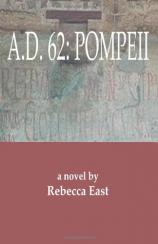Excerpt
Excerpt
A. D. 62: Pompeii: A Novel

My Shakespeare-loving parents named me Miranda; and like my namesake, I longed for distant worlds. I searched for refuge from the sound and fury of modern times; I lived through books and dreams. I was a beige country mouse of a person, small and shy. A poetically inclined friend said I had faraway eyes and pre-Raphaelite hair, so perhaps I looked less drab to other people than I believed in my darker moments. My classmates called me "the walking encyclopedia"; the nickname was a compliment of sorts, but it reminded me that I was a misfit.
In spite of my meek temperament and ordinary appearance, I cherished secret hopes that I might someday become a heroine in a life of great adventure, and find a place where I could belong. Because of my fascination with the massive picture books in the dustier regions of the library, and the drawings and photographs of once-proud cities they contained, I fixed my interest upon one particular distant world: ancient Rome. I studied classical archaeology at Harvard and made plans for a quiet life as a teacher and scholar. I was just one among the many who trudge to and from work every day through the winter-gray streets of Boston, comforted only by an imagined world of warmth and color that might exist only in my mind. And then one day, fate intervened to offer me a different path.
I learned that the man who had bought us, Alexander, was the steward for a household just outside a small city. He and Demetrius had much to talk about; I just looked around and listened. We walked out of the compound and climbed into an ox-drawn wagon; this would take us to our new home. The wagon was loaded with sacks, barrels, and amphorae; apparently Alexander had also purchased supplies on this trip.
As we rumbled along the road, jerking and tossing in the cart, we headed south along the same major road that I had traveled earlier. Another slave drove the wagon; Alexander and Demetrius perched on sacks near the front, engaged in lively discussion. I was in back with the supplies, free to look about and study the landscape. The dominant feature was the same mountain I had noticed earlier. I recognized its shape from a famous mural that had been found in Pompeii: it was the classic pointed shape of a volcano. At the moment it looked deceptively peaceful, with orchards and vineyards rooted in the rich volcanic soil on its flanks, and villas as tiny as dollhouses on the lower slopes.
I was certain I knew what it was, but I asked Alexander the name of the mountain to make sure, and he told me: "Vesuvius". He informed me that our destination was a villa was just outside the city of Pompeii. I couldn't have been more pleased! Pompeii...
I had walked the excavated streets of Pompeii in my other life. Archaeologists had found jewelry, dishes, tools, surgeon's instruments, furniture, statuary, stashes of coins, and countless other personal possessions. Even the remains of eggs, cakes and chicken set out on tables for lunch on that fatal day had been excavated. The murals of gods and goddesses and garden landscapes still retained some of their vivid colors; the floors were still paved with black and white stone mosaics of detailed nature scenes or elaborate geometric patterns.
The words of ancient Romans had also remained - accounting records, lawsuits, letters, military discharge diplomas, love poems, and curses. The walls of buildings were covered with neatly lettered advertisements and political slogans, and with sloppy graffiti of all sorts, ranging from the poetic to the scatological. Quotations from the Aeneid: "Arms and the man I sing..." Rueful apologies: "I wouldn't have wet the bed", one guest at a local inn wrote on the wall, "but they didn't provide a chamber pot!" Scrawled words on the walls recorded the gossip, loves, hates, and rivalries of people who lived almost two thousand years ago. Their words fascinated me.
The outlines of their bodies made a chilling impression on me. The bodies of victims who were buried in the eruption left cavities in the hardened mud and lava; archaeologists made casts of these bodies by filling the cavities with plaster. So much detail was preserved that even facial expressions and the folds of clothing could sometimes be recognized. A father sheltered his child in his arms; a dog lay twisted in agony as it struggled to break loose from its chain. A fully armored soldier stood guard at the gate of Herculaneum and died standing at his post. A wealthy woman, draped in expensive jeweled necklaces, was found in a cubicle at the gladiator training school - had she merely taken refuge there as she tried to escape from the town, or had she gone there for a tryst with a lover? Some people suffocated; others were blown to bits by flying debris that had been flung with deadly force.
I was more interested in their lives than in their tragic deaths. The surviving writing provided tantalizing clues about the nature of those lives. Only a small portion of the writings of ancient Romans still existed, repeatedly copied and handed down across the centuries. Surviving documents included a letter home from a soldier, complaining about hardships and begging his parents to send him money and warm clothing; a love poem in which a man idealized the beauty of his mistress and complained about her fickleness; and a lawsuit in which a freedwoman fought to retain her freedom and recover ownership of her property from her greedy former mistress.
I had fallen in love with that lost world, and so, in spite of the poor job prospects, I had studied Classical Archaeology. That knowledge was the main reason the science team had chosen me for their time travel project. And now, to my great delight, I was going to see the city that had inspired my fascination with the past.
The eruption that would bury Pompeii was still eighteen years away; and I didn't expect to stay in the past for very long, perhaps only a few days. And yet the sight of the volcano chilled me. This was a city whose death I could foresee, and that was distressing knowledge.
A. D. 62: Pompeii: A Novel
- paperback: 292 pages
- Publisher: IUniverse
- ISBN-10: 059526882X
- ISBN-13: 9780595268825








